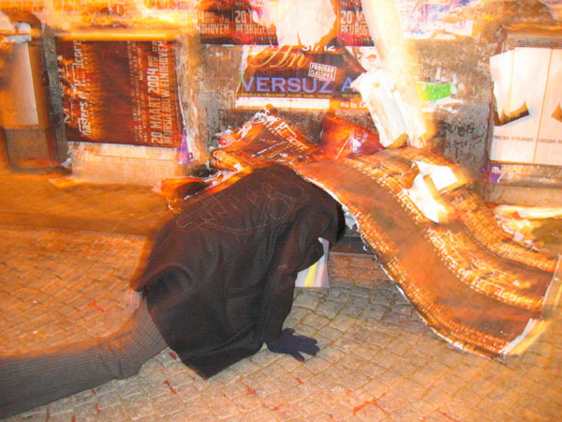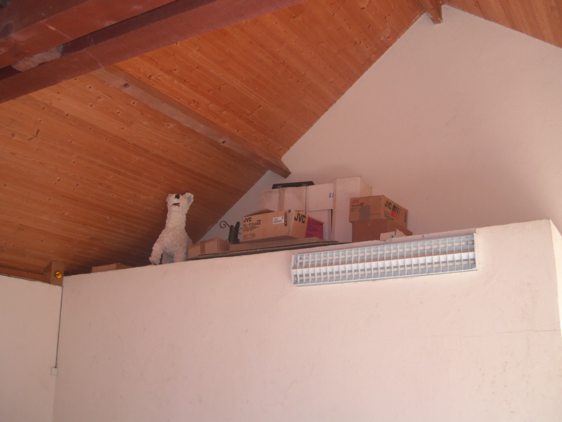[8 January 2004] dawn
Early dawn. Open the shutters. Turn off the house lights. A full moon sets.
|
on information habit
With technologies that work together to develop public open space as an information sharing and communication arena (ubiquitous computing, wireless networks, GPS, monitoring, data tracking — including their devices and services) some notions on how we consume and produce information become critical. Both in a socio-political and in a cultural-educational context information equality has to remain the prime perspective.
First we have to acknowledge an information society's basic rule that every citizen is equally an information producer and an information consumer. Without this notion, which needs articulation in every possible way, and protection by those who have advocated open media all along, a genuine information society will not come about. Instead we will be imprisoned in a post-mass media hybrid of a communication system, which allows no symmetrical exchange between information depending parties. Technology, art/design and business shall take this issue to heart and help accomplish its conditions in conceptual, experimental and serviceable ways.
To make sense of why, where and when information space and physical space interact, how that interaction challenges our notions of private and public life and the ways we conduct business and engage in leisure activities, the way we learn and become knowledgeable, is ultimately a democratic process. Yet this process needs to get its cues from bold proposals that contest otherwise too simple consensus or conventional interest.
Over the coming decades, when what in retrospect will be known as the Early Information Age is shaped, boundless culturally divers ‘information habits’ will emerge. The popular notion of ‘leapfrogging’ into new media opportunities, for those parties who suffer technological or economical disadvantage, better be extended to include the overcoming of many cultural arrears the world over which are traditionally expressed in intolerance, discrimination and exploitation.
|
[7 January 2004] information habit
In a couple of contexts I am challenged to think about our information habit (by which actions, rituals and routines we consume and produce information in everyday mobility) — or how and when it would replace information superstition and media ignorance. I propose ‘leapfrogging’ not only as a possibility to overcome 'technological and economical disadvantage' (you know where western myopia situates it), but also cultural discrimination and exploitation — right here on our privileged doorstep.
Subscribed to P2PJ list, peer-to-peer journalism.
|
local color
thank you for your inspiration, touchpad touché wacom welcome
|
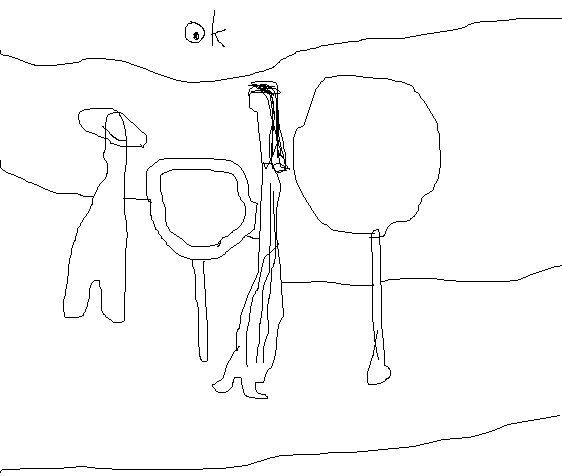
|
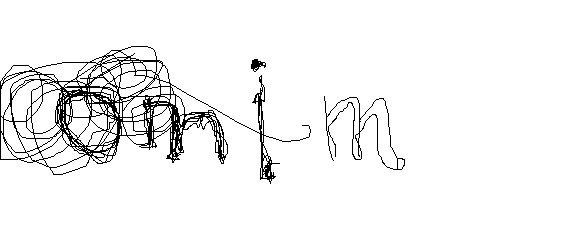
dear god have me draw more too; graphicconverter line drawing, 562 x 230 pixels; tonight
[6 January 2004] vigilance
Si les autorités sur lesquelles cet Ouvrage est appuyé, ne paroissent pas suffisantes pour convaincre un Lecteur, déchirons les Histoires & ne croyons plus aucun fait.
M. Caraccioli, La Vie du Pape Clement XIV, 1776, quoted in Johannes Testis Monstrans' Halve waarheden, Korsaar 1989.
Hier waak ik was sent to editor Jorinde Seijdel of Open magazine yesterday. Last night and this morning I start polishing it. Still have to add also Schrijfbaarheid to my list of ‘other texts’.
Re: publishing. Back to Quark. For the OMIM book series I have to figure out how different editorial and production relationships perform, and how to link the resulting works to provide micro and macro view with each volume, be it 8 or 800 pages. Also I would recycle two earlier titles, somewhere included.
Local color observation. Books are so calm.
Look here. Certainly if you'd agree that “You can't make art by making art.” David Ireland was brought to my attention by Barbara Bloom years ago. I have his A Decade Documented 1978-1988 through her, but I've never seen his work. I do not understand why this major retrospective does not travel to Europe. He's virtually unknown here.
|
|
[5 January 2004] the books, finally
This morning around 8:30, just before getting up excitedly, I suddenly and totally unexpectedly solve my book problem. The book problem is primarily an editorial and a publishing problem, then a production problem, then a distribution problem. Not a content problem — if you love books. Most books are made without these problems, or have solved them. We like to think. My books I hope to make despite around at the cost of these problems. My books I hope for to embody these problems. OMIM.
The Halve waarheden and ‘Hoe zijn de reacties?’ format (146 x 230 mm. stolen from Rodney Graham's Lenz) rulez. Making a book is not the book problem. You can do it. Professionals will help you typeset it, illustrate it, print it, bind it. Eventually sell it. Making a great book few are capable of, like with everything ‘great’. Great writing delirious texts quite some authors are capable of, in the eyes of quite a few readerships. They all attract their own. Readers flock around texts. Bibliophiles flock around books. Let's make a couple of great books for these bibliophiles was my second idea this morning. Books made just like I make NQPs. A daily operation.
To distinguish a book from other kinds of printed matter is all too easy. But to make a book unlike a book, nevertheless adopting the book format, use its distinguished qualities without taking all its fixed meanings for a departure, is a challenge which could make a great book, or great books. Let's organize some editorial and publishing qualities around the printed tome.
Like I was a Koninklijke Subsidie voor de Schilderkunst nominee before being a painter, ran an artist space before being an artist, was a publisher (Korsaar vs. Kierkegaard... take two) before being an author, etc. So, originally I'm a publisher before anything else. I will make books to publish... anything really.
Listening to Barry McGuire's Eve of Destruction, an MP3 download. Ah! Tell meeee over and over and over again my friend. I pop a bottle of Jacky Nicolo BRUT. Billy Bragg and Wilco come after Barry McG., again and again — in 01Tunes, alphabetically by artist, that is.
Look here.
|
top of the head check list
(book) publishing authors
Ian Hamilton Finlay's printed matter
Christopher Alexander's ‘The Production of Houses’ et al.
Joke Robaard's flyer series
Bruno Munari titles
(comics series, columns?)
(serial publishing)
authors not publishing bodies of text
Paul Valéry's ‘Cahiers’
stand alone outstanding books
‘TADANORI YOKOO’, by Tadanori Yokoo, 1977
‘The Gentle Art of Making Enemies’, by James McNeill Whistler, 1890
‘The System of Landor's Cottage’, by Rodney Graham, 1987
‘Computer Lib/Dream Machines’, by Ted Nelson, 1974
‘A Sheet of Paper’, by Remy Zaugg, 1987
Museum Abteiberg catalogue, by Imi Knoebel, 1984
‘Notes in Hand’, by Claes Oldenburg, 1971
‘Giorni del Secolo Nuovo’, by Nicola de Maria, 199?
publication series
Open Pamphlet series
book marked architecture
scriptorium (ubiscribe, ibilect)
book shelf
library
library ladder
|
local color
In from the spamscape. Re: NQPAOFU, omnia mea in media just dot it!
|
[4 January 2004] shuffle
Stuff moves around the house. The tree goes out the window, some vinyl moves two rooms away from the studio, plates change walls, folders are checked for waste. 3B pencils are sharpened. Pockets are emptied. The gate remains shut all day.
|
|
[3 January 2004] slow feed
No feed today. Stig Dagerman tells me not to make/take life into performance. I dreamt my dad performed as Saint Nicolas in some costume extravaganza, bringing in lots of masked kids as his help and parading with at least 4 other Saint Nicolases, some of which were positively French. OK. Dressing up is one possible way for an identity to brrrand. But Saint Nic' alas?
Life runs slow feed. No RSSity here. Even when the pace and mood swing high, the organism takes its time to process every thrill. Even when bright ideas spring up the plenty inside of it, they erupt without clear cut form. Don't mistake the experience's excitement for even the tiniest of a message. It doesn't produce but a lot of air stirred not shaken.
|
|
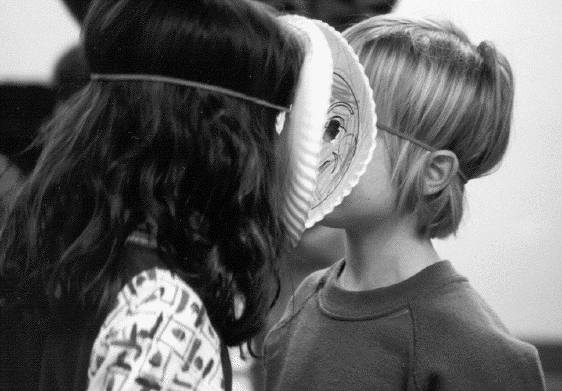
face plate moon mask anonymity identity inquiry
[2 January 2004] face value
New Year's day is spent out in the snow, on the phone and behind the keyboard, delivering (uhm) new nqp design and functionality and furthering the Open essay. It is concerned with the different conditions of both ‘anonymity’ and ‘identity‘ in an information saturated environment which overlaps (or, depending your notation system preference: merges, links) with your physical environment. Read/write my moves. Abhishek just sends me the ‘thumbnails’ of his graphics which go with the essay.
With information gathering from sensored/censored phenomena becoming pervasive and information processing, as a result of its flexible calculating, comparing numbers old and new, evaluating data back and forth in time, making them up for multiple formats, space, time and identity — and how we use our concepts of each to conceive of (to memorize) the others — will break free into our new sum symbolic sympathies.
We should be (not paranoid but) well aware of what we publish to whom, through which systems of representation. Control will not decrease nor increase (the hunger for it, as its limited possibilities of enforcement, being an absolute), but its productive loop of mechanics-becoming-informatics-feeding-new-mechanics will be different: read different, write different; contain different, pattern different.
To Abhishek I mail at 02:26: “This short essay looks into how identity and anonymity are differently challenged strategies for a relative freedom of expression and ‘memory’: allow how to build, maintain and expand (produce?) the integrity of one's experience and social re:liability. I apply these notions to how different ‘spaces’ present different conditions for such interests as identity, security (and its challenges), intellectual and emotional growth.”
Identity I need to face my friends, as it is with their recognition that I build one — anonymity to be invisible to my enemies, as it is for their prying eyes that I hide myself.
Listening to Nitin Sawhney's latest and Pink Floyd's first.
|
|
[1 January 2004] one new year
Preamble. At its break we'll be at the Cuncy les Varzy gathering, which includes La Grange Treillard's Florence and Patrick and Monceaux le Comte's Honorine and Derk.
Time in a bottle for 2003. Happy new year to all of you. The secret word for 2004 is deliver, next best to: ‘follow through’.
Francine sends me a very thin book.
Ma vie n'est pas quelque chose que l'on doive mesurer. Ni le saut du cabri ni le lever du soleil ne sont des performances. Une vie humaine n'est pas non plus une performance, mais quelque chose qui grandit et cherche à atteindre la perfection. Et ce qui est parfait n'accomplit pas de performance: ce qui est parfait œuvre en état de repos.
Stig Dagerman, ‘Notre besoin de consolation est impossible à rassasier’, (Vårt behov av tröst, 1952)
Abhishek sends me a quote.
Imprisoned by four walls
(to the North, the crystal of non-knowledge a landscape to be invented
to the South, reflective memory
to the East, the mirror
to the West, stone and the song of silence)
I wrote messages, but received no reply.
Henri Lefebvre quoting Octavio Paz in The Production of Space.
This morning's landscape reminds me of my second favorite Little Golden Book, after and like Mijnheer de hond (Mister Dog) a Margaret Wise Brown title, illustrated by Garth Williams: Ik hou zo van (The Friendly Book)
SNEEUW! DAAR HOU IK VAN!
Koude sneeuw
Dwarrelsneeuw
Witte sneeuw
Zachte sneeuw
Sneeuw vind ik reuzefijn!
Sneeuw die neervalt zonder geluid
Wit in de blauwe nacht Wit op de daken
Wit op de boomtakken Wit op de heuvels
En overal is het héél stil
Sneeuw! Daar hou ik van
Rilke... I stumble on his Poésie in a NQPaOFU 32 dip in and reach for it on the shelf.
O mesure d'attente...
Fenêtre, toi, ô mesure d'attente,
tant de fois remplie,
quand une vie se verse et s'impatiente
vers une autre vie.
|
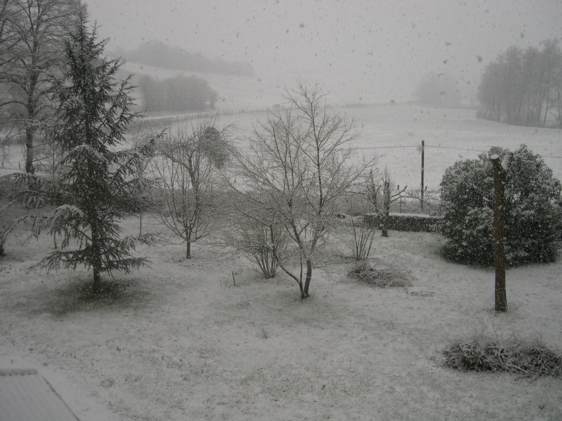
|
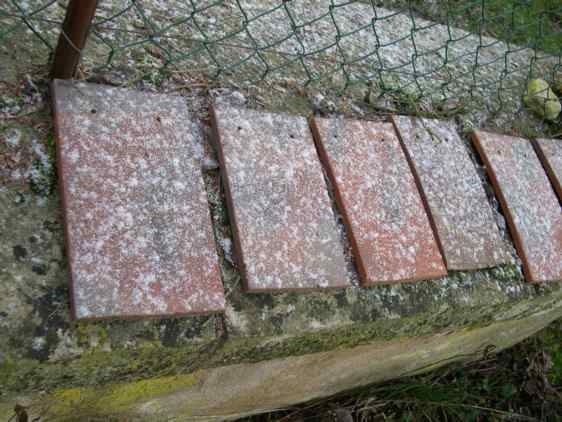
snow speckle side by side flake freeze on roof tile samples
[31 December 2003] pointillé
I open the shutters of the kitchen on one clear morning. Some of the horizontal surfaces are speckled with snow. Covered with white spots the 2.5 ton stone slab that one day we hope to install as a table top looks grainy like a b/w photo. Temperature must be just below zero to secure every single flake to freeze where it touches. None is falling just now. This gentle cover came at night.
Up early I clean out the dining room of its overlooked christmas leftovers and tableware, light new candles in the holders, saw some wood and light the fire. I take the 01Book from the study to the dining room. As much as I'd love to own a Powerbook G4 I'm rather attached to my Macedelica. He who never throws a Mac owns some since 1986. I'll have to rearrange the museum as much as God's Own Attic when R+r move. With the incoming stuff from G.'s parents, with me spending more time in F., working at different projects, with new priorities and urgencies to be expected for 2004, things and bodies will once again move around the old house. From tomorrow. Midst illusions, the new year's an especially strong one.
We returned from NL last night. More crazy driving taking me back and forth. For 2004 however one solemn intention is to stay at the Moulin more, to do much more Origami and flower arrangements, install more files, dress more including down, invite more friends, run more video and audio, grow more, burn more — I'll be here to stain more and clean more, mark the site, bring it home.
|
|
[29 December 2003] r8
At noon I pick up Roemer and Rolf at their friends Anne and Marthe's in Amsterdam. Last night Tijl and Adrienne took them there from Zevenaar where we returned G.'s parents, who'd stayed with us over Christmas. Yesterday part of the family gathered in Z., where we finish emptying the old family house. Roemer's 8th birthday was celebrated in advance and will be continued today.
|
|
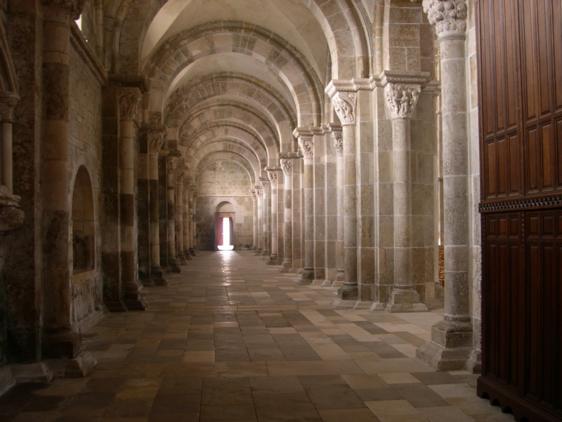
[26 December 2003] Basilique Sainte Marie-Madeleine de Vézelay
You find yourself in a deserted public place of deep, slow spirituality.
G. notices that Rolf burns a candle for my mother, the grandmother who he never knew. It is one of our habits but this time he takes the initiative all by himself, from his own pocket money. Over the past months he is quickly maturing, taking all kinds of new responsibilities. Also: he wants a room for himself and has decided for God's Own Attic, which I knew I would have to give up at some point. He wants to paint it all purple and decorate it with Harry Potter paraphernalia. G.'s long time friend Anne Lammers does all HP design for the Dutch market and brings him a couple of large self-adhesive transparencies which have been produced to be used in the book shops window. Wow!
Roemer will move to the attic after him and take another room. They will more or less take over that floor, which for the moment has only one electricity outlet and still faces the repair of all of its roofing over the years to come. We'll have to speed up its interior renovation and re-allocate some, err, ‘stuff that surrounds us’.
|
|
[24 December 2003] traces
Metropolis M publishes two pages of NQP in fc highres small print. Nice scroll and 4 column page flip. The printed page gives such a different experience. It is like peeking into a miniature, a doll's house NQP. I must do the nqpaofu.compendium for next summer. Different peeking over at Doors East where more papers are being published every day.
|
|
[22 December 2003] meanwhile...
First snow on Moulin grounds this morning. Very light when I take a shower, then larger flakes for a while, thin again, dissolving into the wet and muddy earth. The light between sun up, sun down, is stretching.
Design and crime. I shall read Foster's ‘diatribes’, for distraction. I have finished ‘Schrijfbaarheid’ on Flusser ('s Die Schrift) last week for Metropolis M. For Open I'll be collaborating with graphic artist Abhishek Hazra who I met in Bangalore.
|
|
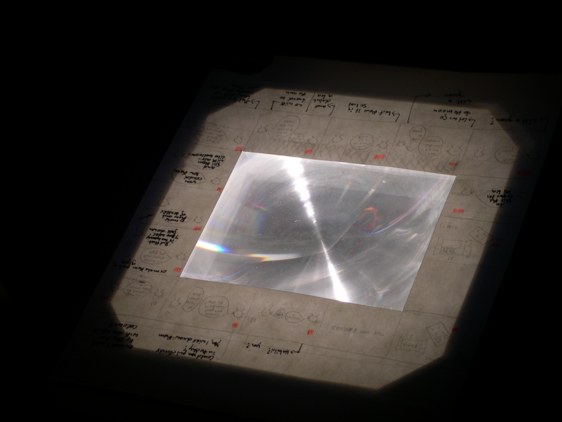
the way we screen
[19 December 2003] storyboard
Annette Stahmer's overhead storyboard for a live cartoon sequence performance at the JvE final presentation 2003.
|
|
nqpaofu.com 1998-2004 jouke kleerebezem Notes Quotes Provocations and Other Fair Use
| | | |
